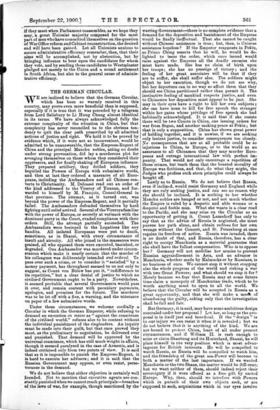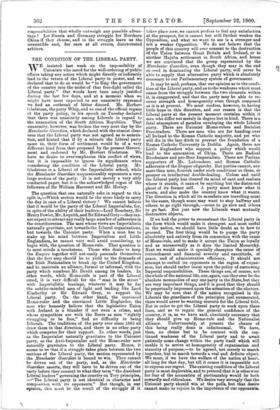THE GERMAN CIRCULAR. - wr E are inclined to believe that the
German Circular, which has been so warmly received in this country, may prove even more beneficial than is supposed, especially if it is true that it was preceded by a telegram from Lord Salisbury to Li Hung Chang almost identical in its terms. We have always acknowledged fully the extreme complexity of the situation in China, but that complexity has never reconciled us to the obvious ten- dency to quit the clear path prescribed by all admitted notions of justice and right. We hold it to be proved by evidence which, if it were not so inconvenient, would be admitted to be unanswerable, that the Empress-Regent of China and the principal Manchu nobles, acting no doubt under strong provocation, did lay a murderous plot for avenging themselves on those whom they considered their oppressors, and for finally shaking off European influence. They prepared artillery, they drilled soldiers, they beguiled the Powers of Europe with submissive words, and then at last they ordered a massacre of all Euro- peans, including the Ambassadors and all Chinese con- verts to Christianity. M. Delcasse read out an order of the kind addressed to the Viceroy of Yunnan, and for- warded to himself by M. Frainois, Consul-General in that province. The attempt, as it turned out, was beyond the power of the Empress-Regent, and it partially failed. The Ambassadors defended themselves by hard fighting until relief arrived. Several of the Viceroys familiar with the power of Europe, or secretly at variance with the dominant party in the Court, evaded compliance with their orders, Still, the attempt partially succeeded. The Ambassadors were besieged in the Legations like any bandits. All isolated Europeans were put to death, sometimes, as in Shansi, with every circumstance of insult and atrocity. All who joined in the massacres were praised, all who opposed them were executed, banished, or degraded. One Ambassador was murdered under circum- stances which make it nearly certain that the murder of his colleagues was deliberately intended and ordered. To pass over such a crime, or to consider it "satisfied" by a money payment, has throughout seemed to us not only to suggest, as Count von Btilow has put it, "indifference to its repetition," but a clear denial of justice to which no civilised Government ought to be a party. Nevertheless, it seemed probable that several Governments would pass it over, and remain content with pecuniary payments, apologies, and promises for the future. The murderer was to be let off with a fine, a warning, and the utterance on paper of a few submissive words.
Under these circumstances, we welcome cordially a Circular in which the German Emperor, while refusing to • demand an execution en masse as "against the conscience of the civilised world," refuses also to be content without the individual punishment of the ringleaders. An inquiry must be made into their guilt, but that once proved they must, as the preliminary to negotiation, be delivered over and punished. That demand will be approved by the universal conscience, which has still much weight in affairs, though it seemed paralysed in the case of Armenia, and is indeed criticised only from two points of view. It is said that as it is impossible to punish the Empress-Regent, it is hard to execute her advisers ; and it is said that the Russian Government may oppose, or even resist, perse- verance in the demand.
We do not believe that either objection is certainly well founded. Not to mention that executive agents are con- stantly punished when we cannot reach principals—breaches of the laws of war, for example, though sanctioned by the warring Government—there is no complete evidence that a demand for the deposition and banishment of the Empress would be finally ineffectual. That she cannot be caught without Chinese assistance is true ; but, then, is Chinese assistance hopeless ? If the Emperor reappears in Pekin, as Prince Ching asserts that he will, he would be de- lighted to issue the order, which once issued would raise against the Empress all the deadly enemies she must have made. She has no claim of birth upon her troops ; she has no prestige of victory ; and the feeling of her great associates will be that if they are to suffer, she shall suffer also. The soldiers might object to her execution, though we do not see why, but her departure can in no way so affect them that they should see China partitioned rather than permit it. The instinctive feeling of mankind respects justice, and even to Chinamen her deposition must appear to be just. She may in their eyes have a right to kill her own subjects ; she can have none to kill for free speech the stranger within her gates whose privilege of free speech she had habitually acknowledged. It is said that if she resists there will be two Courts in China, one issuing orders for war from Segan, and another making peace at Pekin; but that is only a supposition. China has shown great power of holding together, and it is unwise, if we are seeking only lenient justice, to consider consequences too closely. No consequences that are at all probable could be so injurious to China, to Europe, or to the world as an assurance to all Chinamen that they may murder Euro- peans and outrage international law with perfect im- punity. That would not only encourage a repetition of those crimes, but teach them that the boasted morality of Europe was fictitious, and that, do what they might, the Judges who profess such stern principles could always be bought off.
Lastly as to Russia. We do not believe that Russia, even if inclined, would resist Germany and England while they are only seeking justice, and can see no reason why she should be inclined. It is nothing to her whether Manchu nobles are hanged or not, and not much whether the Empire is ruled by a despotic and able woman or a despotic and feeble man. What she wants is a clear road to the Pacific, and she may seize on the Circular as an opportunity of getting it. Count Lamsdorff has only to say that as the advice of Russia is neglected, she must pursue her path alone, and obtain redress for her own wrongs without the Concert, and St. Petersburg at once regains its freedom of action. Russia was invaded, there is no doubt of that, and Russia, therefore, has a clear right to occupy Manchuria as a material guarantee that she shall have the fullest compensation. Who is to oppose her ? Germany will not mobilise her armies to prevent Russian aggrandisement in Asia, and an advance in Manchuria, whether made by Salmucks or by Russians, is no business of ours. We cannot stop it without stopping also the whole progress of the world and risking a war with two Great Powers; and what should we stop it for ? Merely because we fear that Russia may at some future time claim a monopoly of Manchurian trade, which to be worth anything must be open to all the world. We believe that the Circular will be accepted in Russia as a, great opportunity, and that she will make a merk of abandoning the guilty, asking only that the investigation shall be full and fair.
But Germany, it is said, may have some ambitious design concealed under her proposal ? Let her, so long as the pro- posal is in itself just and beneficial. If the " design " is to our injury we can resist it when it is revealed ; but we do not believe that it is anything of the kind. We are not bound to protect China, least of all under present circumstances, and if William II. is rash enough to seize or claim Shantung and its Hinterland, Shansi, he will place himself in the very position which is most advan- tageous for British interests. He will be compelled to watch Russia, as Russia will be compelled to watch him, and the friendship of the great sea-Power will become to both a matter of the last importance. If we wanted Manchuria or the two Shans, the matter would be different; but we want neither of them, should indeed reject their sovereignty if it were offered as a free gift by united Europe. Why, then, should we interfere with Powers which in pursuit of their own objects seek, or are supposed to seek, acquisitions which in our eyes involve responsibilities that wholly outweigh any possible advan- tage? Let Russia and Germany struggle for Northern China if they choose, and in the struggle leave us the irresistible and, for once at all events, disinterested arbiters.







































 Previous page
Previous page